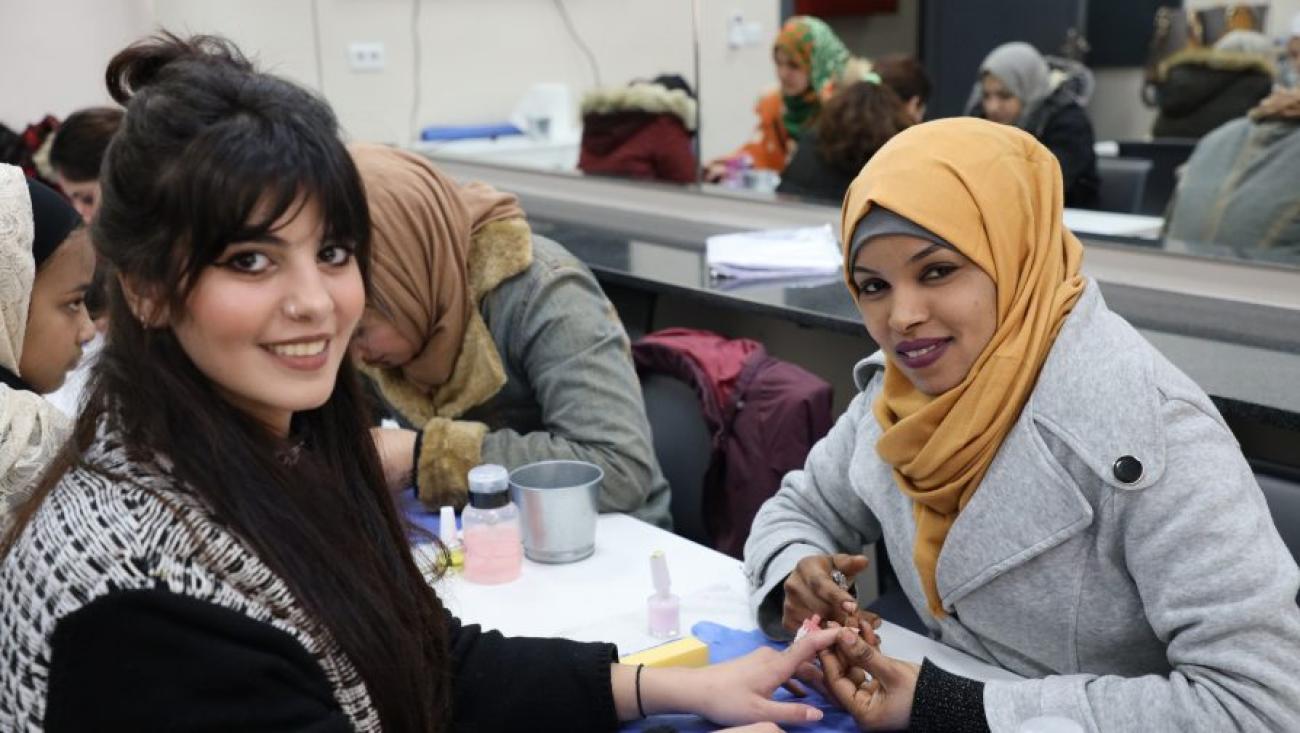Fighting for a higher education

In late 2019, UNHCR launched a technical and vocational diploma scholarship program for 58 students, including two Yemenis, three Sudanese and five Iraqis.
Jordan has one of the highest youth unemployment rates in the world. Almost 40 percent of those aged 18-30 cannot find work and among refugees the rate is even higher. There are multiple contributing factors, including a very unstable region which has hampered trade and exports, but one thing is clear, more training is needed to align the skill set of young people with the needs of the Jordanian labor market. Additionally, for refugees, learning a specific skill can become a lifeline once they return to their country of origin or if they are resettled to a third country.
In cooperation with Luminus Technical University College, in late 2019, UNHCR launched a TVET diploma scholarship program for 58 students. Focusing on vocational training, it is the first time that UNHCR is supporting both the local population and refugees – of all nationalities – in accessing a higher education diploma.
For those like Shams, a 21-year-old Jordanian, who before beginning the beauty diploma course spent her days aimlessly on social media, the program has been an eye-opening experience.
“Among us there are two Yemenis, three Sudanese and five Iraqis as well as twelve Jordanians. I’ve learned about their cultures and ways of living. Before I didn’t really interact with non-Jordanians. Now they are my friends.
Shams says the opportunity to share experiences and traditions has been a highlight of attending college; the Sudanis are particularly skilled in Henna, while she has taught them different makeup styles which are common in Jordan.
In addition to learning new skills, for refugees like Hussneiya, a 27-year-old refugee from Darfur, Sudan, the diploma scholarship has been a lifeline.
After delivering her first child at seven months via c-section in Sudan, there were many complications. Despite multiple follow up procedures, due to ongoing conflict, the treatment required was not available and Hussneiya was left in constant pain.
Desperate times and escalating conflict led to Hussneiya and husband selling all their possessions to buy a plane ticket to Jordan with the hope that the operation she needed would be available.
But after arriving in Jordan a year and a half ago, Hussneiya became more and more isolated, just moving between hospital and home. “I didn’t even know the names of the streets in Jordan or any of the people. I was in constant pain and depressed.”
Despite still needing further medical intervention, Hussneiya describe how being a part of the course has completely changed her outlook on life. “Although I used to work in salons back in Sudan, I didn’t have the technical knowledge. Learning all the techniques, for example around manicure and pedicure, over the last month has been so interesting.”
Beauty is not the only option. Luminus is also supporting access to fashion design and hybrid car mechanics, offering refugees and Jordanians the opportunity to receive vocational training. And following the Global Refugee Forum in December, UNHCR is committed to ensuring that refugee and host community students can succeed where they live. Building partnerships with organizations like Luminus Technical University College and Nour Hussein Foundation who are also facilitating the program is a key part of this.
Waleed, a 25-year-old Yemeni refugee and Nasir Aldin, a 27-year-old Sudanese refugee, for example are a part of the hybrid car mechanic training. Consisting of a mix of theoretical and practical courses, it is hoped that students, where possible, will find employment among this growing sector in Jordan – thirty percent of cars in Jordan are now hybrid – one of the highest rates in the Middle East.
The positive psychological effect of now having a purpose is immediately obvious when talking to Waleed. Back in Yemen he was studying communication at university in Sanaa, had a small mobile phone repair shop and freelanced as a voiceover actor in his spare time. After fleeing to Jordan three years ago, life completely changed. His younger brother who had had a kidney transplant some years before was in urgent need of treatment and Waleed was left responsible for the income of his family.
“Although I have felt welcomed in Jordan, life is hard here for non-Syrian refugees, especially financially as we are not allowed work permits,” Waleed explains. Working informally where possible repairing phones, Waleed was always worried about what might happen if he was caught. The monthly stipend of 60 dinars provided by UNHCR to students on the course, although not sufficient, has provided a little relief.
Waleed also believes that the transferability of the skills he is learning will standhim in good stead for the future. “I knew some things about electronics because of my work with mobile phones but now my knowledge has increased so much even in just a month.”
Whilst the enthusiasm of all students at learning new skills is apparent, all are concerned about what will come next, especially for the non-Syrian refugee students like Nasir al-Din, who are currently not eligible for work permits in these specialized areas. Many are looking for opportunities abroad.
“The good thing is that hopefully this diploma will be recognized in countries like Canada or France. It is accredited by Bosch and so it gives me hope” Nasir al-Din concludes.




